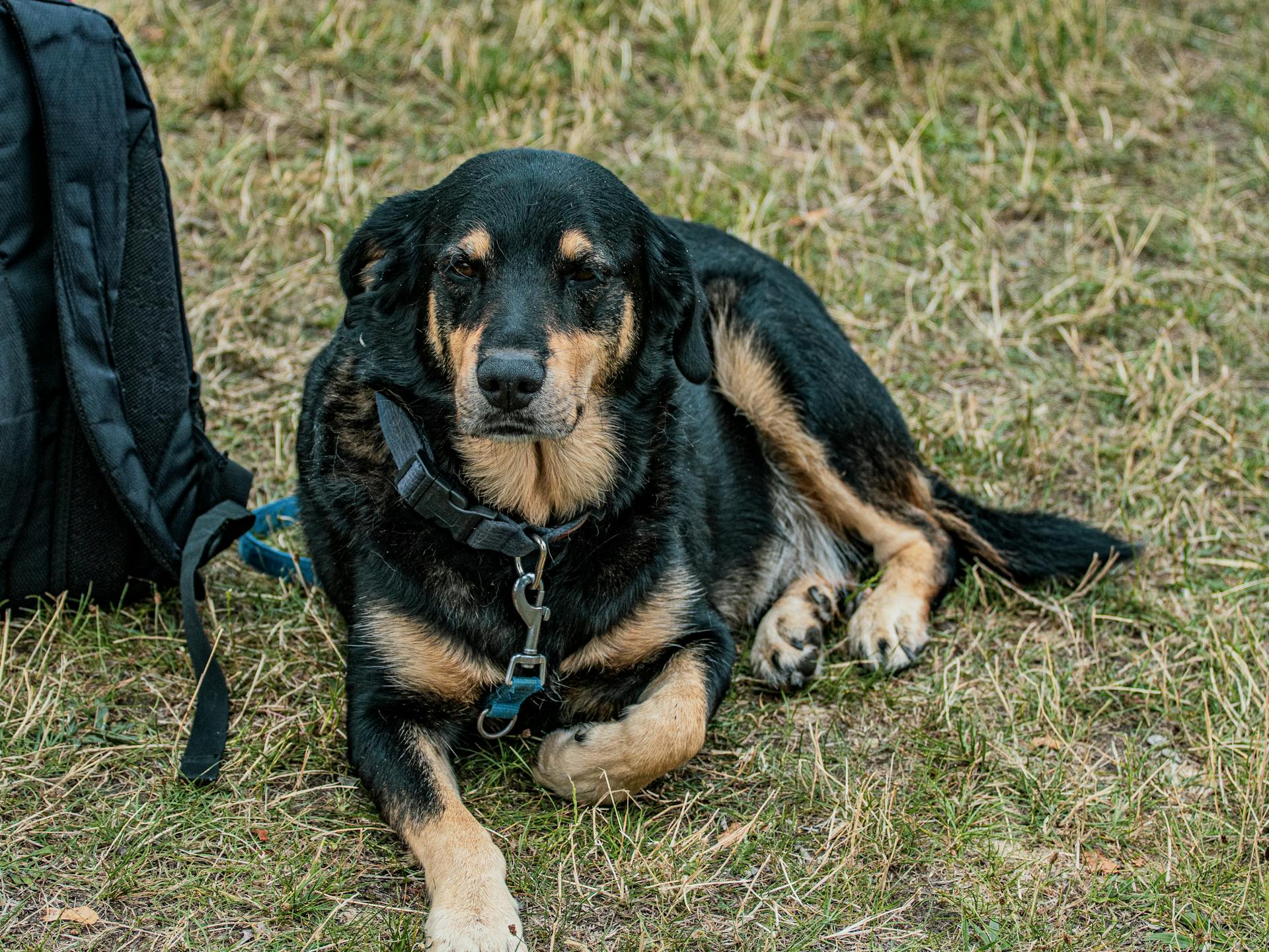
Rottweilers are often misunderstood as being aggressive and intimidating, but the truth is, they can be wonderful family dogs. They're naturally protective of their loved ones, which can sometimes be misinterpreted as aggression.
Rottweilers are known for their loyalty and affection towards their families, making them great companions. In fact, they thrive on human interaction and attention.
Their intelligence and trainability make them highly responsive to positive reinforcement training, which is essential for developing good behavior. With proper training, a Rottweiler can become a well-behaved and loving family member.
With regular exercise and mental stimulation, Rottweilers can channel their energy into playtime and activities, rather than destructive behavior. This makes them a great fit for active families who enjoy outdoor activities.
Basic Breed Information
Rottweilers can grow up to 24-27 inches in height and weigh between 85-130 pounds.
Rottweilers have an average life expectancy of 8-11 years.
Rottweilers require regular exercise to stay healthy and happy, with a minimum of 30 minutes of exercise per day.
A fresh viewpoint: Do Rottweilers Need a Lot of Exercise
Rottweilers have a short, dense coat that requires minimal grooming, but they do shed heavily.
Rottweilers are prone to certain health issues, including hip dysplasia and elbow dysplasia.
Rottweilers are a large breed and need plenty of space to move around, making them a great fit for families with a big yard.
Rottweilers are generally a healthy breed, but responsible breeding practices are essential to minimize the risk of inherited health issues.
Broaden your view: Common Health Issues with Rottweilers
Personality Traits
Rottweilers are known for their confident nature, which can sometimes be mistaken for being unfriendly. This confidence, however, is just one aspect of their personality.
Rottweilers are also incredibly loving dogs, often showing their affection through leaning or cuddling with their family members.
One of the most notable personality traits of Rottweilers is their protective nature, which can be both a positive and negative trait depending on how they are trained and socialized. Rottweilers have a strong instinct to protect their family, but this can also lead to aggressive behavior if not properly managed.
For more insights, see: Keeshond Personality
A well-socialized Rottweiler is a joy to be around, and they can quickly become a loving and loyal companion. In fact, Rottweilers are more than happy to plop into their owner's lap for an extended cuddle session.
Here are some of the key personality traits of Rottweilers:
- Confident
- Good-natured
- Devoted to family
- Intelligent
- Trainable
- Cuddly
- Don't tend to bark
Overall, Rottweilers are a loving and loyal breed that thrive on attention and affection from their family. With proper training and socialization, they can become a wonderful addition to any family.
Friendliness and Socialization
Rottweilers are incredibly friendly and affectionate with those they care about, especially when properly trained and socialized from puppyhood.
Their loving family life is a top priority, and they adore being part of a family willing to nurture them. A Rottweiler's playful and affectionate personalities make them one of the most popular dog breeds.
However, their guard dog history can make them prone to showing emotions in a way that may intimidate someone unfamiliar with the breed. Rottweilers are a particularly vocal breed, and their grunting and whining can quickly turn into growling or barking if they're upset.
To avoid behavior that could be seen as aggressive, dog owners should learn to recognize these signs and train their pets early on.
Friendliness and Socialization
Rottweilers are incredibly friendly and affectionate with those they care about, especially when properly trained and socialized from puppyhood.
Their loving family environment and willingness to nurture them make them a great breed for families. However, their guard dog history can make them prone to showing emotions in a way that may intimidate someone unfamiliar with the breed.
Rottweilers are a particularly vocal breed, and their grunting and whining can quickly turn into growling or barking if they're upset. Dog owners should learn to recognize these signs and train their pets early on to try and avoid behavior that could be seen as aggressive.
With proper socialization and introductions, Rottweilers get along well with children and other pets. They are natural pack animals and love to be part of the family.
Rottweilers are very loyal to their family and are loving, devoted, obedient dogs who enjoy cuddling, playing, and leaning against you. They like to sit on your feet and lie on your lap.
They prefer to be near their favorite humans and don't do well being left alone for long periods of time. A well-socialized Rottweiler enjoys the company of children and other household pets.
You might enjoy: Water Loving Dogs for Short Nyt
Should You Get a Mix?
If you're considering getting a mix, you might want to think about the benefits of a Rottweiler mix. They can often create great pets for you and your family.
A Rottweiler mix can inherit the friendly personality traits from its parent breeds. For example, a Labrador mix can bring a playful and outgoing nature to the mix.
Some common Rottweiler mixes are the Labrador mix, the German Shepherd mix, and the Pitbull mix. Knowing the characteristics of these breeds can help you choose the right mix for your family.
A Rottweiler mix has a unique combination of personality traits from both breeds. This can make them a great choice for families who want a loyal and loving companion.
Related reading: Flat Coated Retriever Traits
Training and Behavior
Rottweilers are highly intelligent and trainable, ranking ninth in Stanley Coren's list of most intelligent dog breeds. They excel in obedience training and are eager to please, making them excellent additions to search and rescue teams and police K9 units.
Rottweilers need regular mental stimulation to prevent boredom and destructive behavior. Without proper training and socialization, they can become anxious and aggressive.
To avoid Rottweiler behavior problems, it's essential to teach them that the human is the alpha in the relationship. With positive training and socialization, Rottweilers can be wonderful family dogs and loving companions.
Here are some positive temperament traits of Rottweilers:
- Confident
- Good-natured
- Devoted to family
- Intelligent
- Trainable
- Cuddly
- Don’t tend to bark
Rottweilers can make excellent family pets, including households with young children or other pets, if properly socialized and trained. With the right approach, they can be loving and loyal companions.
Expand your knowledge: Is a Corgi a Good Family Dog
Negative Traits
Rottweilers are not inherently aggressive, but rather are shaped by their genetics, upbringing, and environment. With proper socialization, training, and understanding of their needs and body language, they make excellent family pets.
Their reputation as a dangerous attack dog is often a result of poor training and socialization. A Rottweiler's behavior is a reflection of how they are taught to behave.
Check this out: Welsh Corgi Training
Rottweilers who are not properly trained and socialized can develop behavior problems. This is not because they are inherently bad dogs, but rather because they lack the guidance and positive reinforcement they need to thrive.
Adopting an adult Rottweiler from a shelter or rescue organization can actually be a safer option for families with children. Adult dogs are calmer and their personalities are already established, making it easier to predict their behavior.
Rottweilers are often banned by home insurance companies due to the misconception that they are inherently aggressive. This misconception is not supported by facts, and with proper care and training, Rottweilers can make wonderful family pets.
Explore further: Adult Rottweilers
Intelligence and Trainability
Rottweilers are highly intelligent dogs, ranking ninth in Stanley Coren's list of most intelligent breeds. They excel in all three types of intelligence: instinctive, adaptive, and working/obedience.
Rottweilers are known for their sharp perception and extreme sense of loyalty, making them well-suited for roles like search and rescue and police K9 units. Their high intelligence also makes them excellent assistance and service dogs.
Suggestion: Dogs Breeds That Start with B
With proper training, Rottweilers can be easy to train, but they require regular mental stimulation to prevent boredom and destructive behavior. Without this stimulation, they can become anxious and destructive.
Here are the three types of intelligence in dogs, as identified by Stanley Coren:
- Instinctive intelligence: the ability to perform tasks that come naturally to dogs, such as hunting and herding
- Adaptive intelligence: the ability to learn from experience and adapt to new situations
- Working/obedience intelligence: the ability to learn and perform tasks that require obedience and discipline
Rottweilers score very well in all three categories, which is why they are so easy to train. They are especially good at obedience training and enjoy having a job to do throughout the day.
Owning a Dog: What You Should Know
Owning a dog is a big responsibility, and it's essential to understand the breed you're interested in before bringing one home. Rottweilers, in particular, require careful consideration.
They can be wonderful companions if socialized and trained properly, but without continued supervision and obedience training, they can be too much for many households. A Rottweiler's size and strength mean they need regular exercise to stay happy and healthy.
You'll need to invest time in training your Rottweiler, especially if they're dominant. Consistency is key when teaching a strong-minded dog to respect your authority.
Rottweilers are prone to obesity, so regular exercise is crucial, both as puppies and adults. They can weigh up to 135 pounds, so be prepared for a large furry friend.
With the right training and care, a Rottweiler can be a loyal companion, but be aware of the breed's potential liabilities, including insurance issues and potential aggression towards other dogs or cats.
Worth a look: Why Are Labradors so Friendly
Raising a Happy Rottweiler
Raising a happy Rottweiler requires early obedience training, which is an absolute must from a young age. Working with a professional dog trainer can make a big difference, especially if you're new to Rottweiler ownership.
Consistency is key, so creating a schedule and reinforcing good behavior with treats will help improve training outcomes. Affirmative hand gestures can also be useful in teaching your Rottweiler to respect your authority.
As working dogs, Rottweilers aren't naturally disobedient, so once they're trained, their training will stick for life. Socialization with other people and animals is also crucial, as it will help them grow into gentle, well-mannered companions.
Discover more: English Cocker Spaniel Working
How to Raise a Happy Child
Raising a happy child is similar to raising a happy Rottweiler in many ways. Consistency is key, so establishing a regular routine for your child, just like a schedule for your dog, can help them feel secure and develop good habits.
Creating a positive environment is crucial for a child's development, just as it is for a Rottweiler's. Exposing your child to various experiences, sights, and sounds, similar to introducing a Rottweiler puppy to new environments, can help them become adaptable and confident.
Positive reinforcement is essential for children, just as it is for Rottweilers. Rewarding good behavior with treats and praise, just like reinforcing good behavior with treats and affirming hand gestures, can encourage positive behavior and strengthen your bond with your child.
As a child grows, they need mental and physical stimulation just like a Rottweiler. Engage your child in activities that challenge their mind, such as problem-solving with puzzles or teaching them new skills, and provide opportunities for physical activity to keep them happy and healthy.
Evolution Across Life Stages
As a Rottweiler owner, it's essential to understand how their temperament evolves across different life stages. Rotties are typically loyal dogs who enjoy having a job to do.
As they mature, you can expect subtle changes in their temperament, which can influence their care. This means that their needs and expectations will shift as they grow and develop.
Rottweilers are often described as "velcro dogs" because of their strong attachment to their family. This loyalty is a characteristic that remains consistent throughout their lives.
In their puppy stage, Rottweilers are playful and energetic, requiring plenty of exercise and training to channel their energy. As they enter adulthood, their energy levels may decrease slightly, but they'll still need regular physical and mental stimulation.
As Rottweilers enter their senior years, they may become more laid-back and relaxed, but they'll still require regular care and attention to ensure a happy and healthy life.
Consider reading: Easy Breeds of Dogs to Take Care of
Rottweiler Safety
Rottweilers are not inherently aggressive, but they are protective of their family members.
To ensure a Rottweiler is a safe and loving companion, it's essential to provide positive reinforcement training and socialization from a young age.
Experts agree that with proper socialization, Rottweilers can be cuddly companions that make excellent family dogs.
Here are some pet insurance options available for Rottweiler owners in various states:
By understanding the needs of Rottweilers and taking steps to ensure their safety and well-being, you can enjoy a loving and lasting relationship with your Rottweiler companion.
Sources
- https://www.britannica.com/animal/Rottweiler
- https://www.petscreening.com/blog/rottweiler-temperament-a-dog-owners-guide
- https://www.dutch.com/blogs/dogs/rottweiler-temperament
- https://www.petplace.com/article/dogs/breeds/dog-breeds/need-know-rottweiler-temperament
- https://www.forbes.com/advisor/pet-insurance/pet-care/rottweiler-temperament/
Featured Images: pexels.com


